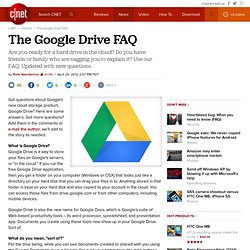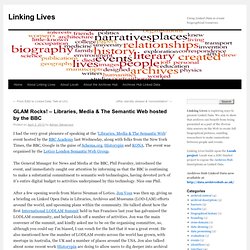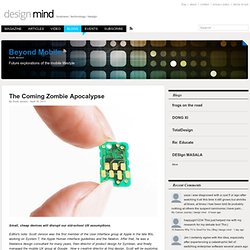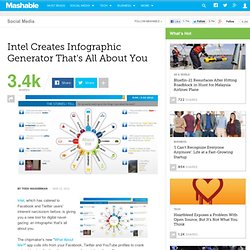

Bassam Tarazi. The Google Drive FAQ. Got questions about Google's new cloud storage product, Google Drive?

Here are some answers. Got more questions? Add them in the comments or e-mail the author; we'll add to the story as needed. What is Google Drive? Google Drive is a way to store your files on Google's servers, or "in the cloud. " Google Drive is also the new name for Google Docs, which is Google's suite of Web-based productivity tools -- its word processor, spreadsheet, and presentation app. What do you mean, "sort of? " Files that you drag into your Drive from your hard disk are actually copied to the cloud. What is synchronization? There is a potential danger when using synchronization: If you update a file before your cloud service has sent you the latest version, you can end up with collisions or version conflicts.
Just to be clear: I can store any file? You can also move entire folders in your Google Drive. I keep hearing about Dropbox. Google Drive is a big threat to Dropbox, but if you like both, use both . New! Sears' PHD Of Social Media Explains How Brands Can Create Orbits To Pull In Customers. GLAM Rocks! – Libraries, Media & The Semantic Web hosted by the BBC. I had the very great pleasure of speaking at the ‘Libraries, Media & The Semantic Web’ event hosted by the BBC Academy last Wednesday, along with folks from the New York Times, the BBC, Google in the guise of Schema.org, Historypin and KONA.

The event was organised by the Lotico London Semantic Web Group. The General Manager for News and Media at the BBC, Phil Fearnley, introduced the event, and immediately caught our attention by informing us that the BBC is continuing to make a substantial commitment to semantic web technologies, having devoted 20% of it’s entire digital budget to activities underpinned by this technology.
Nice one Phil. After a few opening words from Marco Neuman of Lotico, Jon Voss was then up, giving us a briefing on Linked Open Data in Libraries, Archives and Museums (LOD-LAM) efforts around the world, and upcoming plans within the community. Silver mentioned that Google is their biggest data consumer, using their microdata and RDFa. The Coming Zombie Apocalypse.
By Scott Jenson - April 18, 2011 Small, cheap devices will disrupt our old-school UX assumptions.

Editor's note: Scott Jenson was the first member of the User Interface group at Apple in the late 80s, working on System 7, the Apple Human Interface guidelines and the Newton. After that, he was a freelance design consultant for many years, then director of product design for Symbian, and finally managed the mobile UX group at Google. Now a creative director at frog design, Scott will be exploring the future of mobile on his blog.
Recently, Verizon and T-Mobile announced they would be shipping $50 Android phones quite soon. The commoditization of smartphone hardware is just the beginning. These examples are just the initial, telltale signs of a huge new wave of cheap devices about to invade our lives—a zombie apocalypse of electronics, if you will. Taken together, these two trends, represent an interesting challenge, especially for the UX community. Intel Creates Infographic Generator That's All About You. Intel, which has catered to Facebook and Twitter users' inherent narcissism before, is giving you a new tool for digital navel-gazing: an infographic that's all about you.

The chipmaker's new "What About Me? " app culls info from your Facebook, Twitter and YouTube profiles to crank out a data visualization of your composite social media profile. For instance, there's a graphic that looks like a flower that tracks your interests based on what you tweet and write status updates about. There's also a record of your most popular post ever and your most popular pic, your ratio of self-created updates vs. found information and "likes. " Other data includes an assessment of your overall mood, your daily habits (night owl vs. early bird) and stuff you've recently talked about. Intel, which released a well-received app called The Museum of Me last year that created a video along the same lines, clearly believes that the best way to woo social media aficionados is by preying on their self-interest. Attention Narcissists: Intel's Museum of Me App Is for You.
Identity Management.